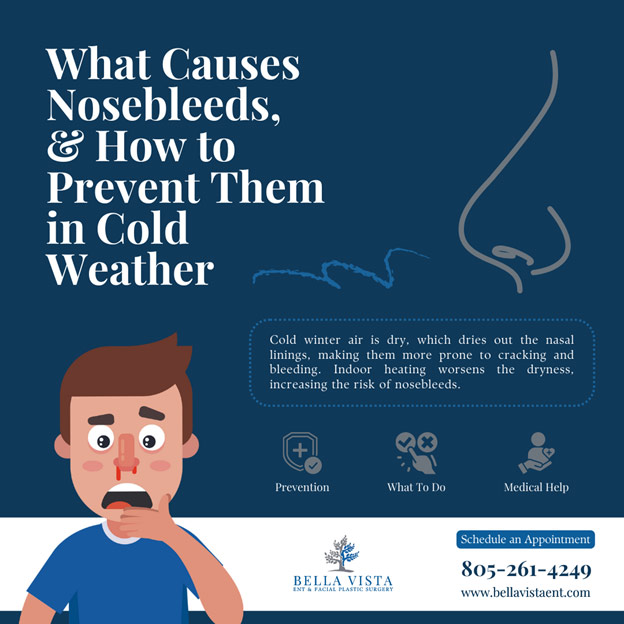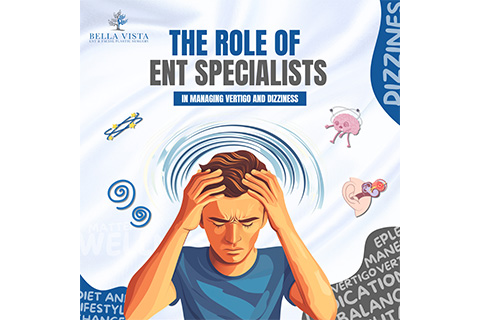What Causes Nosebleeds, and How to Prevent Them in Cold Weather
The inside of the nose contains tiny, fragile blood vessels that can easily break and cause bleeding. Nosebleeds can occur for various reasons, including injury, nose picking, blowing the nose forcefully, allergies, sinus issues, a deviated septum, or the colder, dry winter air.

Nosebleeds and the Cold Weather: How Are They Related?
Winter is here – and as we feel the air become colder and chilly, we also enter the season of nosebleeds. Colder winter air means less moisture and humidity in the air. Not many can recognize the connection but the cold weather and cases of frequent nosebleeds during this season are closely related.
The colder winter weather means dry air. Prolonged exposure to dry air through inhaling it can cause dryness in the nose linings. As we’ve mentioned before, these linings are thin and fragile. When the sinuses, nose linings, and mucus membranes become dry, they become more susceptible to cracking and bleeding.
Additionally, the cold winter air will encourage more people to stay and heat indoors. Indoor heating will further dry indoor air. This puts families at risk of having dry sinuses which are more susceptible to blood vessel ruptures and nosebleeds.
How to Prevent Nosebleeds During Winter Season
Nosebleeds can be bothersome to deal with.Luckily, there are several ways you can prevent nosebleeds during this season:
- Moisturize the nasal passages
The most common culprit for nosebleeds during winter seasons is dryness and dry air. Combat this by moisturizing the insides of your nose. You can use a cotton swab to apply a thin layer of petroleum jelly or antibiotic ointment in your nostrils. Do this gently so as not to injure your nose or rupture the tiny blood vessels in your nose.
- Don’t pick your nose
The blood vessels on the nose are thin, fragile, and susceptible to injury. Avoid picking your noise so as to prevent any injury. Additionally, don’t blow your nose too hard as this can also result in nosebleeds.
- Try using saline nasal sprays
Saline nasal sprays are proven effective in keeping nasal linings moist. Two to three sprays of the solution in each nostril and done multiple times a day can keep nasal dryness at bay.
- Use an indoor humidifier
Winter air is dry and indoor heating further dries out the air inside your home. Run an indoor humidifier to moisturize the air. This, in turn, will moisturize the insides of your nose as well, reducing the risk of blood ruptures and nosebleeds.
- Don’t smoke
Smoking can significantly impact your health, including your nose as it can easily irritate and dry the insides of your nose, increasing risks for nosebleeds.
Stop Nosebleeds When They Happen
Nosebleeds can happen anytime and here’s what you need to do when they happen:
- Lean your head forward. Breathe through your mouth instead of through your nose. Do this sitting down if you can.
- Gently squeeze the soft and fleshy part of your nose for about 10 minutes without stopping.
- Don’t try to put anything (tissue, cloth, or cotton swab) in your nose as this can aggravate the bleeding.
- After 10 minutes, stop to check if the bleeding stopped. If the bleeding doesn’t stop, repeat the gentle squeezing step for another 10 minutes.
- Applying a cold compress on the bridge of the nose can help stop the bleeding.
If Nosebleeds Get Serious: When to Seek Medical Help
Nosebleeds are rarely a cause for emergency. However, get immediate medical care if:
- Bleeding doesn’t stop after 30 minutes of applying constant pressure
- Bleeding is due to a broken nose
- Bleeding occurred after a head injury
Frequent nosebleeds may also be a cause for concern. If this is the case for you, schedule an appointment with your healthcare provider. Your ENT specialist will conduct a series of tests to arrive at a diagnosis and provide you with treatment options for your condition. At Bella Vista ENT, we are here for all your ear, nose and throat concerns!


